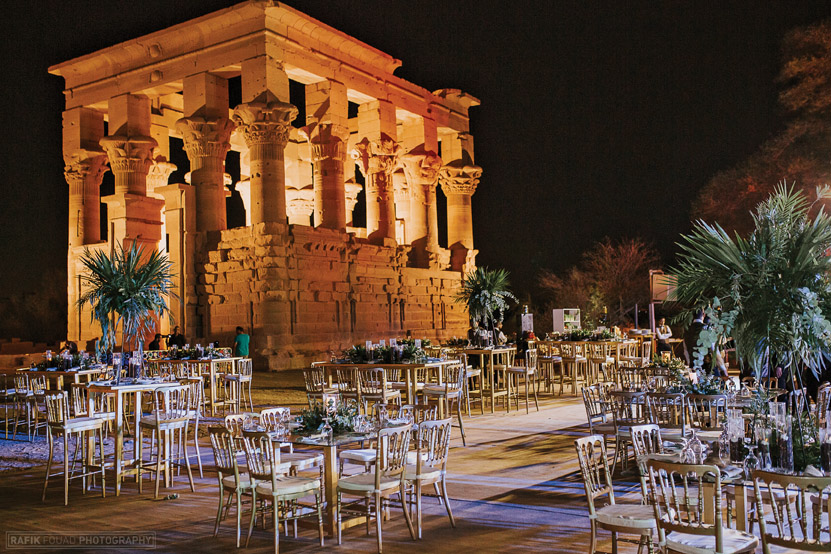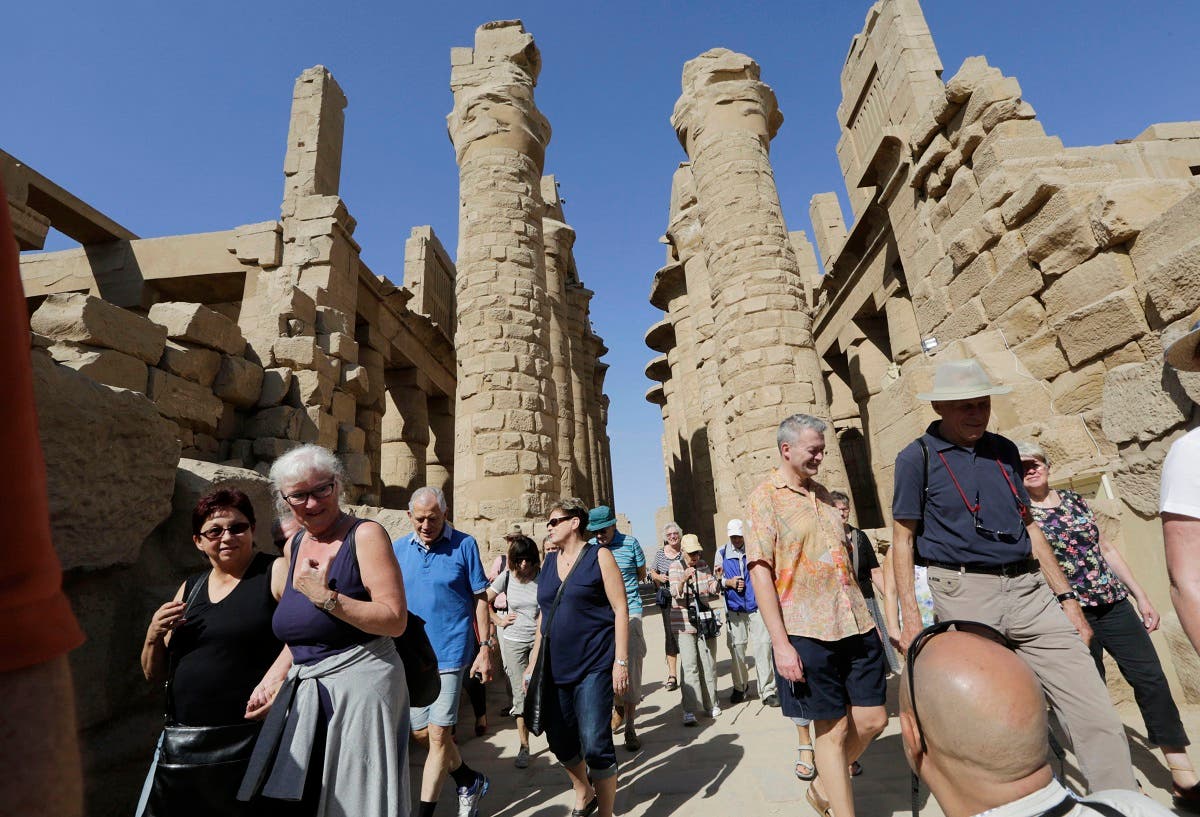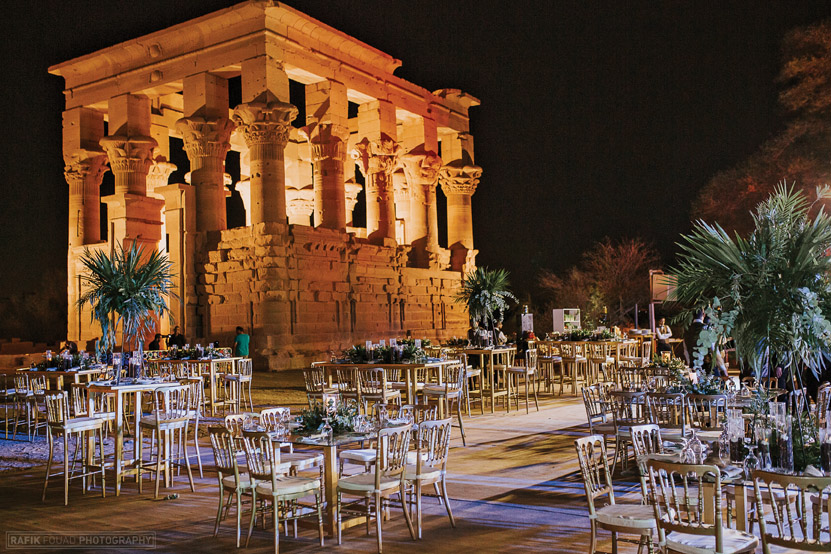
Neon lights bring alive the eyes of statues, and the opaque shadow of a column falls over the dancefloor. It’s a grand sight, perhaps for all the wrong reasons: drinks are half-melted at the base of a limestone ram, a bored child picks their nail into the crevices of an already worn set of hieroglyphs, and a once grand place of worship is reduced to little more than a glorified rave site.
That is what it means to party at a temple.
I’ve always been one to argue that historical sites are legacies designed to be experienced; they are the lingering remnants of a world no one can truly picture, battle-scarred and time-eroded. Visitation should not be limited, in any capacity – or so I thought. When I first heard of historical sites being used as venues for elaborate parties and weddings, I was loath to believe it.
I had my concerns about artifact trade, about strangers chipping off chunks of pyramid and pawning them off for a cold drink of something sour, all the typical hand-me-down worries we inherit from our parents. Still, I didn’t imagine there would come a day when renting out a temple was a viable option to raise funds; the Karnak Temple – a site I was privileged enough to visit – had been reduced to a trifling venue for a nameless, brutally affluent couple.
A one-time thing, I decided. It had to have been.

Mindless Damage
It was not a one-time thing.
Soon after, another story cropped up, stirring its own bouts of local and international controversy. The Philae Temple in Aswan, yet another UNESCO World Heritage site, was reduced to a party-site by a local, ambitious couple. The Karnak incident had set a precedent, a dangerous prerogative which came with a heavy set of consequences.
I imagined the shattered glasses, the inevitable negligence, the ignorant and the willfully malicious scribbling their names into walls. If a tourist could deface a temple with full sobriety, if two juvenile lovers could dig their keys into the Lions of Qasr El Nile – solid bronze and ever-daunting – there was little to stop young party-goers from vandalizing a temple for kicks.


The defacing of historical sites has never been particularly unheard of, nor was it unique to Egypt. From a Greenpeace hypocrisy stunt at the Nazca Lines, to graffiti on Native American monuments: “vandalism hurts,” truly. Still, there is a rather thick line to be drawn between the inevitable and the enabled.

The Egyptian government, when faced with claims of negligence, claimed little knowledge of the weddings – a claim in direct contrast with a decree released by the Supreme Council for Antiques only two years prior to the 2018 events. Reporter Samar Salah al-Din noted that the secretary general of the council had ruled in favor of the “regulated use of historic landmarks for fixed rates,” which included hosting parties, movie sets, and the like.
Such events had only been hosted around rather than within these landmarks, a questionable practice that arose during the Mubarak era. Salah al-Din explained that the sensationalism of the last two weddings across social platforms was the nail in the coffin, making it “obvious that the sites were endangered.”
There was a lack of supervision and a lenience only granted to the elite cliques who could afford such venues. At surface level, there was little respect given to these exceptional locations. According to the Journal of Cultural Heritage Tourism, Egypt has struggled with implementing policies in heritage sites for the better half of the century.
There was no differentiation between general tourism policies and there were no safeguards in place to conserve heritage sites. The same journal argues that damage is inevitable in Egypt’s case, but is made considerably worse when no one is held accountable – which is often the reality.
Touristic pressure is, in and of itself, a colossal threat to these locations (per: the Journal of Cultural Heritage Tourism). Adding grand, sweltering concerts and elaborate weddings is a risk Egypt hasn’t calculated, especially with its distinct lack of restoration and renovation initiatives.
Rehabilitation is a price Egypt presently cannot afford.
“Such events ruin the landmarks which are of a priceless cultural and historic value, not places for partying, dancing, and eating[.] Tourists come to Egypt to visit these places and attend the sound and light shows then they are told that the temple is closed for a wedding,” Abdel Nasser Saber, former head of the Tour Guides’ Syndicate, weighed in on the matter soon after the weddings. Saber maintains that this is not only detrimental to the sites, but also to Egypt’s appeal as a touristic location.


‘It’s Not Destructive If It Isn’t Personal’
Putting the blame on only a handful of couples is also an out-of-pocket argument. In 2019, the Red Hot Chili Peppers lit a fire under Cairo when performing at the Great Pyramid in Giza. It is hard to deny that most Egyptians were thrilled: it is not everyday that huge, acclaimed bands make appearances around here.
According to the LA Times, this was huge as well – an opportunity to “once again put the pyramids on the map as a prestigious international concert venue for A-list musicians.” Ironically enough, the publication admonishes Hosni Mubarak’s autocratic choices in the same breath, despite his era being infamous for this exact mode of operation.
This comes following a legacy of other major artists and labels that have used what is, in essence, a historical gravesite to rave. From Frank Sinatra to Pink Floyd, Khufu has had a front seat view to the belting of Money by David Gilmour. It’s a sight that speaks for itself.
While, unlike the temples, the concerts were hosted further out, they managed to leave the area around these heritage sites in disarray, with trash-control and venue management being one cited issue due to the sheer size of the venue itself.
It becomes a question of whether these sites should be used for events period, rather than just private ones. The fragile nature of antiquity isn’t a viable currency. At least, it should not be.


Money Shouldn’t Buy Everything
The Mubarak era was the birthplace of many questionable decrees, that’s not news to anyone familiar with Egypt’s trapeze-show of a political climate. However, a particularly bad habit that reached devastating traction over the past few decades was wealth as a get-out-of-jail-free card.
It hardly mattered whether allegations were for money laundering, political fraud, or in this particular case, using heritage sites for backyard dinner parties. Both the Karnak and Philae weddings were exorbitant displays of privilege, unsurprisingly, by businessmen who could afford not to care.
The Ministry of Antiquities was quick to deny knowledge of the events, in terms of size and existence, but soon after public uproar it became undeniable: temples were sold for cheap political rapport and a fistful of bribes. The Ministry would later amend its claim, filing a complaint with the tourism and antiquities police against party organizers for violating the original terms of the agreement.
The wedding was meant to be a dinner, a lesser evil.
Much like the Journal of Cultural Heritage Tourism envisioned two decades ago, no one was truly held responsible.
This damaging rhetoric is everywhere in Egypt; it’s neither spoken or unspoken, but money will get you everywhere. However, lines should be drawn when these unjust mercies extend beyond personal freedom and into the realm of community harm.
Any opinions and viewpoints expressed in this article are exclusively those of the author. To submit an opinion article, please email [email protected].







Comments (3)
[…] أمر بالغ الأهمية الهجمات على تحرير أبي الهول واستخدام المعابد كأماكن للحفلاتولكن كما هو الحال في تحليل حاسم لكيفية تفاعل الأفراد […]
[…] and governmental powers is crucial, what with attacks on the Tahrir Sphinxes and the use of temples as party venues, but as is a critical breakdown of how individuals on a base level interact with these historic […]